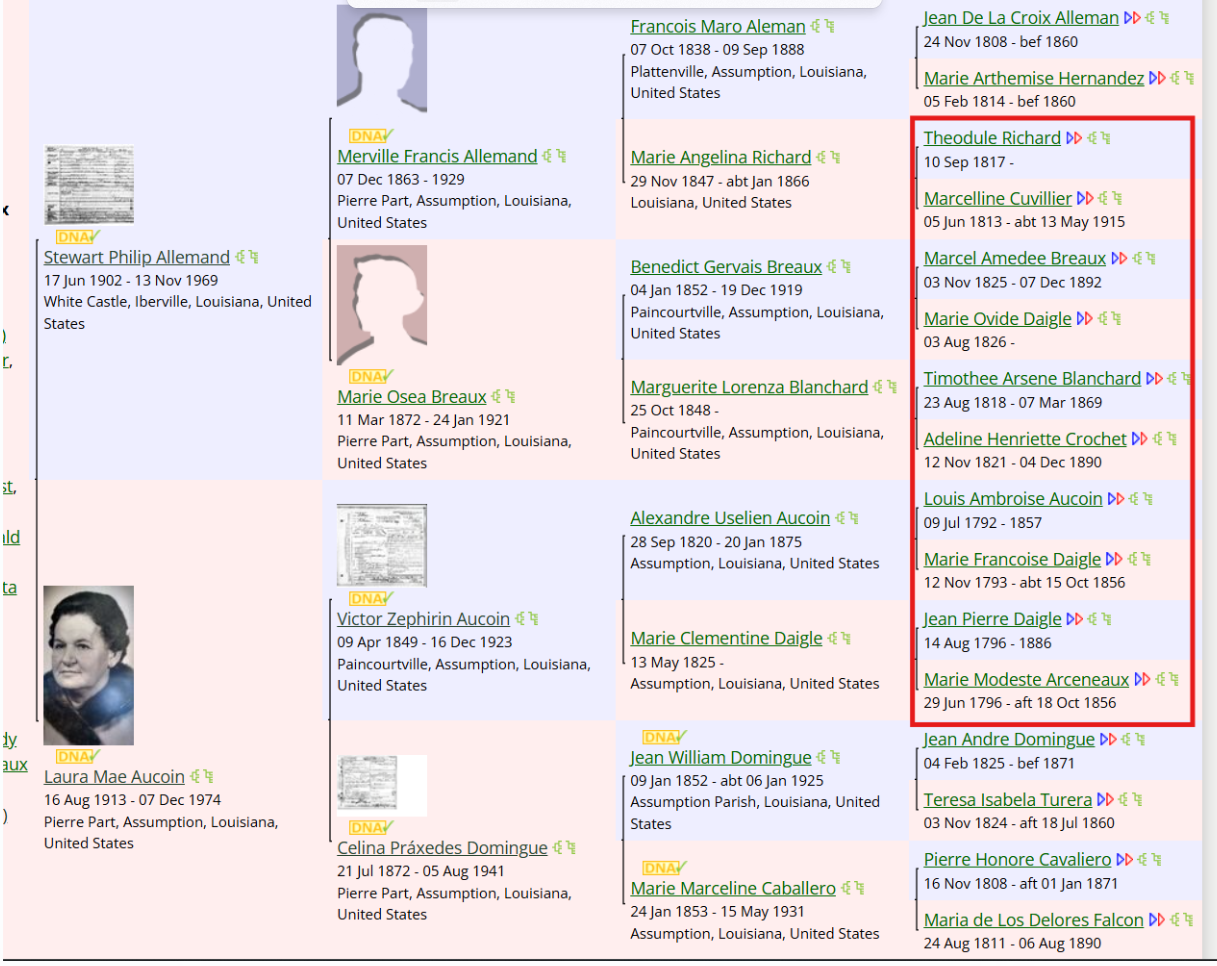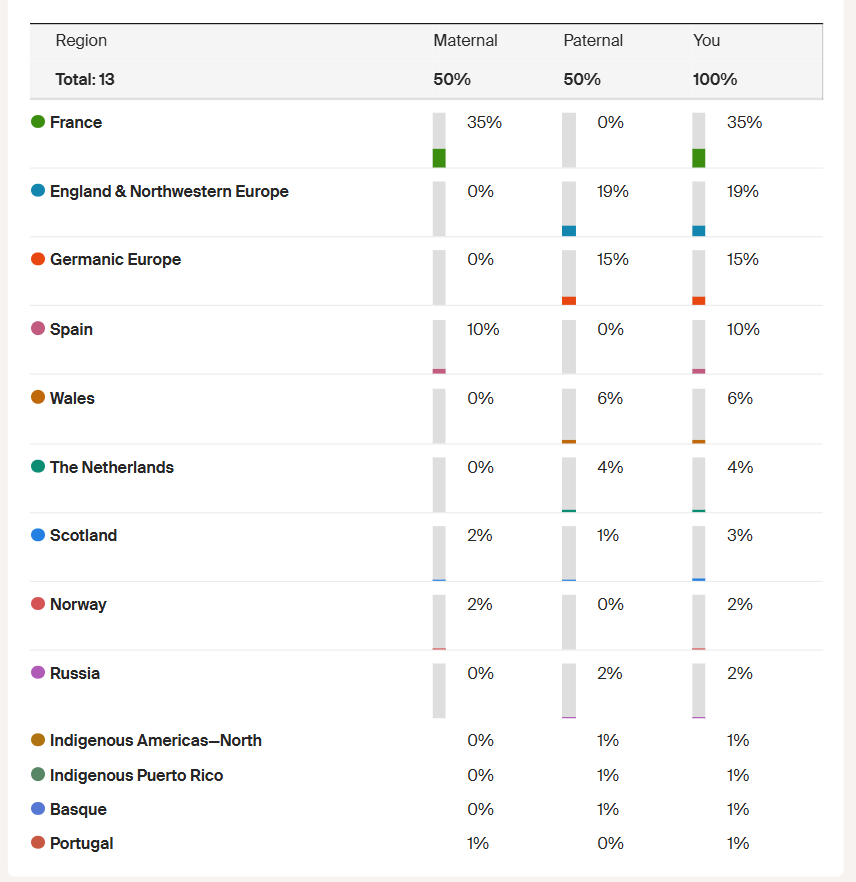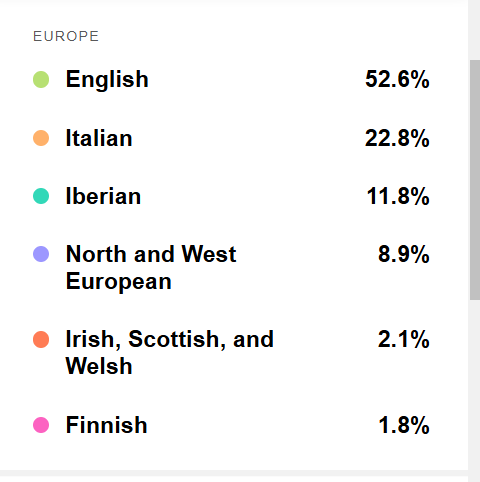How my own understanding of my family has evolved
And also, for fun, comparing it with what DNA estimates report
I have been thinking about how my own conception of my family background has changed over time as I’ve learned more.
This chart represents how I thought about my background before I started doing genealogical research. My mom’s side was “Cajun” and my dad’s side was half-German and half… generic American?
This probably seems weird to anyone who has been reading my Substack for a while. I write about my dad’s side most of the time because that’s the side with my two most persistent brick walls, and I’ve ended up focusing much of my effort on those branches and regions over a long period of time. And I’m usually writing about Cajun/Creole/south Louisiana families. Nitpicking about terminology aside, why wouldn’t I consider my paternal side “Cajun” when my dad clearly has tons of Acadian ancestors and branches in Louisiana since colonial times, too?
Well, my dad’s mom is German. She was born in Wiesbaden, and her family emigrated to the United States in the 1950s. My dad’s dad is actually only half-Cajun; my paternal grandfather’s mom was from Texas. Her ancestors followed a pretty typical path, moving from the northeast/Atlantic states through the Carolinas, Georgia, Alabama, eventually making it all the way to Texas. So my dad’s actually only 1/4 “Cajun” and it just so happens that that 1/4 is where all the fun mysteries are, at least right now. :-)
Culturally, my parents’ families are quite different. My mom’s parents both spoke French as a first language (although none of their children speak French). My relatives on her side sound like what you’d expect to hear when you think about a Cajun accent. My dad’s parents don’t speak French, and my relatives on that side don’t “sound” Cajun, really, at least not to someone who is used to hearing strong Cajun accents. Only my maternal relatives call people “sha” (cher). My mom, but never my dad, uses strange words sometimes that I only learned as an adult were actually French. (I didn’t know minou was a real word that means cat until I was in college, just assumed it was something weird my mom had made up because it sounded cute.) My mom’s side is not particularly religious. My dad’s side is more so, but they’re not Catholic. They went to an Episcopal church when I was little, Baptist in recent decades. My mom’s maiden name is Marceaux, an obviously French-originated surname that is actually only found in Louisiana with the x on the end (or in descendants of the Louisiana Marceauxs that moved elsewhere, of course). My dad’s surname is, well, King. About as generic of an English name as you can find. My mom’s parents lived in Bayou L’ourse; when you exit the highway to get to their house, it basically looks like this:
My dad’s parents have lived in Thibodaux for my whole life, in a neighborhood that looks pretty much the same as most American neighborhoods in small towns. So that’s how I ended up with the impression that my dad’s side is not Cajun. If you ask them, they’ll say they are Cajun. My dad’s family assigns parrains and marrains (godparents) and uses those terms. They are proud of their hunting, trapping, and fishing heritage like my moms’ family. They wear the “coon ass” title as a badge of honor. But the culture in my dad’s family is still somehow far more “standard American”, if you will, from the perspective of a kid who grew up in an air force base town with classmates from all over the United States, but few or no Cajuns. My mom’s family seemed almost foreign, perhaps even more so than my paternal grandmother’s side, who were actually from another country. Even though no one was actually speaking French in my lifetime.
So this is perhaps a more accurate representation.
But it’s still pretty wrong. My mom’s side seemed like a monolith, Cajuns all the way back, but when I built my tree out just a bit more, that nice, neat green box stopped making sense pretty quickly.
This is my maternal grandmother’s tree, showing up to her great-great-grandparents.
Only the ancestors in that red box have French names. The rest are Spanish. All those Spanish lines go back to the Canary Islands; the grandparents of the people on that screenshot were born in the Canary Islands. It isn’t that far back. But still, no one in my family who hasn’t done genealogical research or talked to someone who has about it has any idea that we have any ancestry that is not French/Acadian, despite those pretty significant isleño contributions. Most of the Spanish surnames were Frenchified, and the transition was so complete most people living today who are descendants of these branches seemingly don’t even know they have Spanish ancestors.
Of course, I could keep going back and chopping this up to show a more and more accurate picture. I updated the “American?” label to Anglo-American, which is broadly accurate for that branch. But, generally, this is about right. Most of the lines I’ve lumped into “French” go back to France, eventually, either via Acadia or not. There are a few random wild cards in there, when a French person married an Irish person or something like that; they are few and far between. And my most frustrating ancestor, Aaron King, who was probably not French, whoever he was. There are a good number of “French” lines that are actually German, in the end, if you go wayyyyy back. But, generally, this is a decent high level view what I know of the whole tree.
So, based on that diagram, my extremely generalized ethnicity breakdown, assuming I got an equal amount of DNA from each grandparent (I didn’t) would be:
50% French
25% German
12.5% Canary Islands
12.5% Anglo
How do my DNA results compare?
And why not:
I’m going to do some mental cleanup here. Germanic Europe, Netherlands, and Russia probably all came from my German grandmother. I actually know that I got a lot less DNA from her than I did from my paternal grandfather because he tested, so those three regions (21% in total) may well represent her entire contribution and then some. I share 33% of my DNA with my grandfather, though at least some of that amount is likely due to endogamy and matching him on my mom’s side; he and my mom share about 80 cM in six small segments from their Acadian lines.
Spain and Portugal are from the Canary Islands side.
I’m going to add up all the UK related groups as “Anglo”.
So, for my simplified purposes:
French: 35%
German: 21%
Canary Islands: 11%
Anglo: 28%
Ignoring all the other smaller, more distant ethnicities identified by Ancestry, the big groups match up with my basic tree, although it seems the “Anglo” is pretty inflated and the French deflated from my hypothetical. Actually, before Ancestry’s last update, I had more like 45% French (but also no Spanish). 🤷♀️ Could be due to DNA recombination, could be because the algorithm for estimating ethnicity is not perfect. Almost certainly, it’s both. Because I am a nerd, I want to compare with other sites’ results. I bought all the tests so you don’t have to. (Just kidding, the reason to do that is for the matches, not the ethnicity results. ;-) But just for fun.
It’s a little difficult to do a direct comparison because of the way 23andme has sliced up the regions; “French & German” all lumped together. But I’ll try to fit it into my four-group schema here.
French & German: 50%
Canary Islands: 16% - just taken the whole “Southern European”
Anglo: 28% - British & Irish + “Broadly Northwestern European”
For easier comparison, this was the theoretical breakdown I derived from the tree:
50% French
25% German
12.5% Canary Islands
12.5% Anglo
And what I came up with for Ancestry’s results, had they used my labels, ignoring the smaller groups and the need to add up to exactly 100%:
French: 35%
German: 21%
Canary Islands: 11%
Anglo: 28%
If Ancestry combined French and German like 23andme does, I’d have 56% “French and German” and the same 28% Anglo on both sites. The results are actually remarkably similar to each other even given the different region-chopping methodologies; just have to not read too literally. I probably have higher “indigenous” on 23 because it hasn’t split part of that into specifically Puerto Rican like Ancestry has.
Those two tests are the most popular, and they are the most accurate, in my experience, but since I’m here I might as well mention MyHeritage.
It’s so divergent I don’t even know how to shape it into a recognizable form. I don’t have any Italian ancestors, and I have no idea where the French would even go in here. 🤣 So maybe don’t use MyHeritage for this.













It is both enlightening and curious, isn't it, to have thought of yourself one way, and then to discover the quieter parts? I started out as "French Canadian" though the ancestors had been in the U.S. for 3 or 4 generations. It was always a "French-Canadian who happened to live in the U.S. and had U.S. citizenship." Then comes genealogy and DNA testing and POOF! A bigger slice of the human heritage to explore -- Acadian, Basque, Spanish-Portuguese, British Isles, and a few traces that lead you to ask "well how did THAT happen and what's their story." These rabbit warrens are fun, heh?
Interesting! I suppose I had it easy as a third generation Japanese American. My great-grandparents and 3 of my grandparents were born in Japan. I even have my paternal grandfather's koseki (an official registry of births, deaths, marriages, etc.)